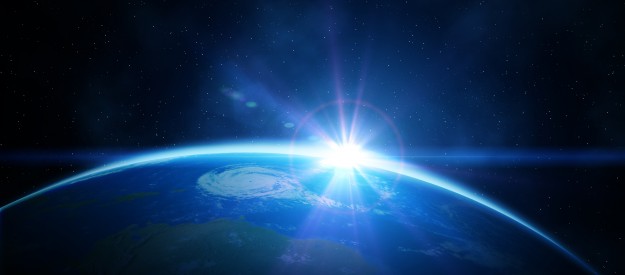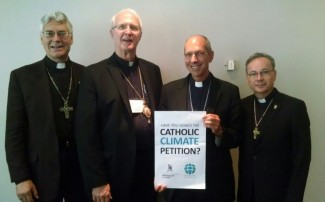"We are losing our attitude of wonder, of contemplation, of listening to creation and thus we no longer manage to interpret within it what Benedict XVI calls 'the rhythm of the love-story between God and man.'"
+ Pope Francis
The dawn (and promise) of global Catholic climate action

The past nine months have seen unprecedented global coordination among Catholics. With the shared goal of working to tackle climate change through international agreements, better business practices, and personal conversion, Catholic individuals and organizations have (often behind the scenes) joined forces with not just each other, but with other faith traditions, secular eco-groups, and governments. With the world preparing for December’s United Nations “COP21” climate talks in Paris, all this global ecclesial collaboration is getting results—even if its causing a few concerns.
Climate change is not a new issue for the Church. Seeking appropriate political actions in response to global warming has long been a concern of local bishop conferences and international Catholic development agencies, most especially those in the Global South, but also in the North.
After the release of Laudato Si’, Western aid agencies like Caritas Europa and the European umbrella group Coopération Internationale pour le Développement et la Solidarité, or “CIDSE,” have been turning up the climate volume.
Both organizations have recently urged European governments and climate negotiators to maintain the goal that global temperatures rise no more than 1.5°C over the pre-industrial period. This number is offered by science and shared by other eco-groups. The organizations ask that this goal be “enshrined in a legally-binding global agreement [because by] ensuring that 1.5°C degree remains within our reach, the world community would show commitment to protect all vulnerable groups.”
While similar exhortations have been voiced for decades by the Catholic social justice community, the last few months have seen rank-and-file Catholics bringing these appeals to the streets.
Coming to a city near you
Tomorrow (October 14th) will see many Catholics joining in the National Day of Action. Organized by the People’s Climate Movement, these coordinated events will be the United State’s contribution to global climate actions that are planned for November 29th—which here in the States falls on Thanksgiving weekend, a time of travel, shopping, faith, football, and family. Because U.S. climate activists wisely choose not to compete with Thanksgiving, the plan is to instead gather in over 100 locations across the country to demand that world leaders act on climate change.
On November 28th, the Global Catholic Climate Movement (of which I am a co-founder) will deliver its climate petition’s signatures to high-level political representatives from the United Nations Climate Change Secretariat and the French Government (who preside over the COP21 Climate Summit) at a major event in Paris with other faith-based groups.

Photo: GCCM.
As with CIDSE, Caritas Europa, and many other activists and scientists, the GCCM petition seeks policies that strive for a 1.5°C limit on global temperature rise.
To date some 100,000 Catholics have signed the GCCM petition, including bishops from four different continents, including the Catholic Bishops Conference of Brazil, Catholic Bishops Conference of Canada, Justice and Peace Commission, Federation of Asian Bishops Conferences, and Bishop Ponce De Leon of Swaziland. Even Pope Francis has endorsed it.
Check here for an updated list of endorsements from bishops and cardinals. If you haven’t already, you can sign the petition here. And you can share it with your eco-contacts.
November 29th will be a big day: The Global Climate March will see tens of thousands of Catholics joining forces on the streets of big cities and small as civil society gets their say before the Paris Climate Summit. The GCCM has been coordinating with other Catholic groups to strengthen our presence in such events. (If interested in joining this moment in history, you can register here to serve as a Catholic point organization and be included on the mobilization map.)
Climate will also be a topic of discussion when Pope Francis visits Africa this November. In preparation, groups such as the Catholic Youth Network for Environmental Sustainability in Africa will be working to connect the words of the Holy Father with the lives of the people, many of whom are feeling now the impacts of a drier continent.
And then on December 1st, the GCCM will host an event in the COP21 venue in Paris, from 9:30 to 11:15 a.m. Details to be announced soon.
To be sure, these marches, petition campaigns, and widespread secular engagement have come thanks to the coordination of groups like CIDSE, the GCCM, the Catholic Climate Covenant, the Archdiocese of Manila, and many more dioceses and groups around the world and within the Vatican. This broad and often informal coalition helps make Catholic climate advocacy focus on more than action.
With help from other climate groups, the GCCM has developed a unique (and maybe first-of-its-kind) global prayer chain. #Pray4cop21 is coordinated via a nifty scheduling interface similar to the ones used on airline booking websites. It’s really very cool—and, ultimately, quite Catholic. Check it out and sign up to pray!
Also taking place are time-tested Catholic practices like fasting and pilgrimages.
In Europe right now, a group of “climate pilgrims” are making their way from Rome to Paris—with the entire pilgrimage having begun in the Philippines in the spring. Led by the former climate negotiator and now activist Yeb Sano, the pilgrimage is getting lots of attention. Sano, who is Catholic, has made faith a significant part of his pilgrimage. (You can learn more about the “People’s Pilgrimage” at the interfaith eco-group Our Voices.)
Fighting temptation
In Laudato Si’, Pope Francis asks for dialogue. In doing so he has carried on the work of his predecessors who, as good shepherds, taught that the core mission of the Church is to enter into and baptize the world.
With the support and example of ecclesial bodies such as the Pontifical Council of Justice and Peace and the Pontifical Academy of Sciences, many Catholic are responding to this call by (often courageously and often for the first time) entering the world of eco-advocacy.
The temptation at such moments, of course, is to become too enamored with human power rather than the less glamorous work of offering people the Gospel, with its always inconvenient cross of sacrifice.
And so increasing calls for civil disobedience at the conclusion of the Paris talks have some worried that Catholic eco-activists may get caught up in what could become ugly "Red Line" events between the police and agitators, who often find their way into such times.
As I wrote to one colleague who shared this news with me, civil disobedience is not my cup of tea. Indeed, it seems more often than not the breaking of the Fourth Commandment. (One group proposing civil disobedience in Paris noted in a training presentation that “we are the ones that we are waiting for.” To which I would say, no. Christ is the one I am waiting for, and in this present fallen age, His grace is sufficient to change hearts.)
Then there is the matter of working with politicians that may share our concerns about climate but not about any other life issue. California Governor Jerry Brown signed legislation last Friday that mandates crisis pregnancy centers provide information about abortion. This applies even to faith-based centers that hope to help women raise their children. He also has signed into law a doctor's-assisted suicide bill. While Brown had been lauded in some Catholic circles for attending a Vatican climate conference in the spring, and while he himself applauded the pope, his slaps in the face of the pro-life movement reminds us that dialogue can often be one sided.
The Catholic difference
The good news is that the climate actions and events I noted above have largely either been led by loyal sons and daughters of the Church or they have been joined by them. Thus the Church is entering the great climate conversation and showing the world that peace, prayer, and sacrifice can do more to change the world than all the politics and civil disobedience of our age.
Yes, I have Catholic friends and colleagues who joke that getting arrested is a badge of honor. And they mean it. But what is clear in this dawn of Catholic climate activism is that the vast majority of us are bringing to this warming world not the darkness of enmity but the light of the Gospel. And our message is simple: light always wins over darkness and even the most corrupt human heart can be healed when it encounters the march of love.
In other words, the Catholic way of things runs counter to the politics and protests of the world.
Which is why, come to think of it, the Prayer of St. Francis should become the battle hymn for all those stepping out these next few months to demand that our leaders, businesses, and consumers do what needs to be done to protect a climate of life.
Lord, make me an instrument of Your peace;
Where there is hatred, let me sow love;
Where there is injury, pardon;
Where there is doubt, faith;
Where there is despair, hope;
Where there is darkness, light;
And where there is sadness, joy.
O Divine Master,
Grant that I may not so much seek
To be consoled as to console;
To be understood, as to understand;
To be loved, as to love;
For it is in giving that we receive,
It is in pardoning that we are pardoned,
And it is in dying that we are born to Eternal Life.
Amen.


















